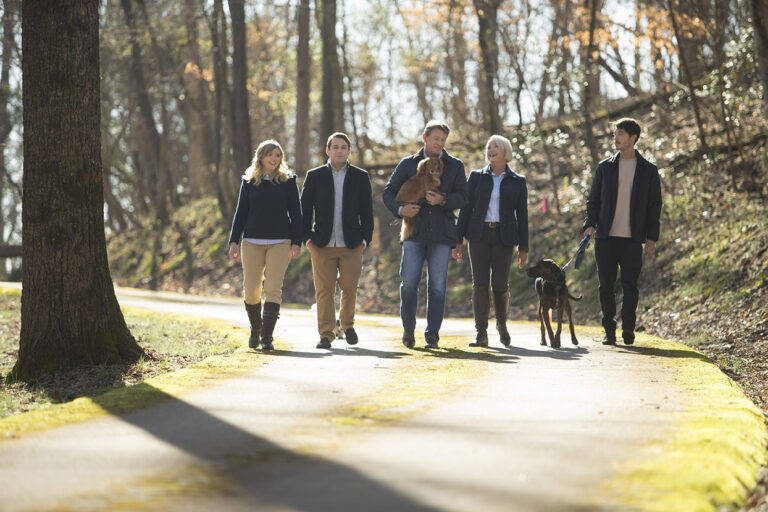Native Knoxvillian, entrepreneur and business owner Randy Boyd believes that the best way to impact his community is through public service–and that’s just what he’s going to do. The 2018 gubernatorial hopeful is chasing the opportunity to serve as the 50th Governor of Tennessee as a way to give back to the state the Boyd family has called home since the 1800s.
“In many ways, I’ve been running all my life–running to be a better husband, a better father and now to be the Governor of Tennessee,” said Boyd. With the election over a year away, Boyd knows success will come down to one key ingredient: work ethic.
As the CEO of Radio Systems Inc. and former Commissioner of Economic and Community Development for Tennessee, Boyd has worked hard to get where he is today. His work ethic developed early in his South Knoxville childhood when his father, Tom Boyd, began bringing him to work every day. For a dollar an hour, he swept the floors until he was old enough to begin working the heavy machinery at his father’s electric fence company. He didn’t just learn a work ethic, however–he also learned resilience. Before his father focused on making electric fences for cattle and horses, he made something called a Fido Shock, a device to discourage dogs from knocking over metal trash cans by applying a gentle corrective shock. Unfortunately, only a year after Fido Shock was invented, so was the plastic garbage can, rendering the Fido Shock obsolete.
“But Dad showed me how to be resilient. To persist and never give up,” Boyd said. At 8 years old, he watched his father start over in electric fences for cattle and horses and build a successful company.
Working with his father wasn’t the only thing that profoundly influenced Randy’s life. Growing up, he would spend about half his time in Vestal, attending the Immanuel Baptist church with his grandparents.
It wouldn’t be until he was married that he’d switch to Erin Presbyterian, where he and his wife have attended for 34 years, always sitting in the same pew his wife’s father sat at. “Every Sunday morning, we feel his presence there.” Boyd said.
First College Grad
At age 16, Randy was ready to move on to the University of Tennessee, but his father was not supportive of pursuing a college education. He thought that Boyd could work in his factory and didn’t need a secondary degree. Determined to make the next step, Boyd struck a deal with hisfather that he would work for minimum wage at the factory to pay for classes at UT.
“Every weekend, I would run injection molding machines, two twelve-hour shifts.” Boyd recalls. “…It really showed me the value of work, and learned the value of education. If you want to make a difference in the world, it starts with education.”
While at college, he doubled down on coursework to graduate early and became the first college graduate in his family at the age of 19. As a newly-minted college grad, he decided to keep working for his father for four years before striking out on his own to start a company. Within a year, that company failed. Forced to confront his own failure but too full of pride to come back to working for his father, Boyd tried again. This time, he learned from his mistake.
A Job Begun
He began selling fencing parts out of an old Dodge Maxi van in June of 1991. He would go from Florida to Georgia to Alabama, staying in the best hotels he could find for under $18. One of his favorites was a $13 a night place in Georgia. “I still remember that hotel,” Boyd remembers, and then laughs, “You never wanted to touch the rug there.”
“…I didn’t have air conditioning in my van, and that’s because I was cheap.” Boyd said. “… but I didn’t have a radio because I wanted to make sure that I was listening to my customers.” In 1989, his customers started asking for the “Invisible Fence.” They told Boyd that they would buy “as many as [he] could get.” So Boyd called the company in order to supply his customers’ demands.
When Invisible Fence refused to sell products to him, Boyd did some digging and found out their patent was about to expire. Seizing his chance, Boyd decided to make his own and sell it as a do-it-yourself product versus the professionally installed sales model the Invisible Company used.
An engineer quoted him $30,000 to design what he would call a Radio Fence. Randy recalls that while that may sound like a lot of money to some, it was more than his total net worth of $26,000. He and Jenny bet everything on the design of this one product. By 1991, they began selling the product. Randy hoped to sell 100 units a month, but instead, in the first month, he sold 3,000 units and $1 million worth in the first year. The next year, sales grew to $5 million, then $9 million and then $15 million.
Though those numbers look good on paper, success didn’t come to him overnight. For the first few years, “I was sleeping three hours a night, and we didn’t know if we were going to make payroll each week. It was very, very difficult times,” said Boyd.
Working out of his van, and then a 40-ft tractor trailer, Boyd had very little to help support his wife, Jenny, and their two-year-old son. This was where his father’s lesson kicked in. To persist and never give up.
Eventually, Radio Fence would give way to the Invisible Fence brand and Radio Systems Corporation. Today, the company makes over 4,600 products with 700 employees and sales over $400 million. “God has blessed both Jenny and I beyond our wildest dreams. I feel like if I spent my whole life trying to pay back what I’ve been blessed to have, I’ll still die in debt,” said Boyd
Giving Back
Overcome by a desire to give back, Boyd’s passion for education emerged as he recalled the trials of being the first college grad in his family. In 2007, he began exploring ways to impact the K-12 public school system in Knoxville, including potentially starting a charter school for at-risk students. He worked with Pond Gap Elementary School to develop a middle ground between public and charter schools–a community school. With the help of UT professor Bob Kronick, Dean of Education Bob Rider and countless other administrative partners, Pond Gap became Pond Gap Full Service Community School.
This concept expands the services of an existing school to offer evening programs for the whole family, from extra reading and math for students to GED classes for parents to dentistry services, along with a hot dinner for the entire family. Based on the success of this model, Knox County has now rolled out 8 other schools funded through the Great Schools Partnership.
People began to notice Boyd’s education expertise, including Governor Bill Haslam. In 2012 ,Randy served in the administration of Governor Bill Haslam as an unpaid advisor on education.
“I was very resistant because I thought that government was too slow and bureaucratic, and as a business person, I would never want to do anything like that, but he [Haslam] convinced me that if you want to make a difference, the place you can make the biggest impact is in public service,” said Boyd.
His work resulted in creating the Drive to 55 and the Tennessee Promise. Tennessee Promise empowers more first generation students to enroll in community colleges and technical schools than ever before, with no additional cost to the taxpayer.
After his successful tenure as a special advisor on higher education, Boyd was appointed to Governor Haslam’s cabinet as the Commissioner for Economic and Community Development, a post that fit perfectly with his skills as an entrepreneur and executive. As commissioner, his new “customers,” Tennessee citizens, showed him just how much work needed to be done for the state to thrive economically and educationally.
He saw that 19 of Tennessee’s counties were in distress, and 33 were at risk. That less than 50% of all Tennesseans got an education beyond high school. Yet his energy, coupled with revolutionary solutions, took him to all 95 counties of Tennessee in a quest to create job opportunities for rural and urban areas alike. Under his leadership, the private sector committed to creating 50,000 new jobs and investing $11 billion in the Tennessee economy.
Those that know him well know Boyd’s passion for public service isn’t just fueled by work ethic: it’s his boundless energy to push limits and never shy away from the challenge. The race for governor may be a year away, but Boyd is busy visiting and revisiting all 95 counties and recently announced his plan to run 537.3 miles across the state from Bristol to Memphis.
In the meantime, you may just see him running down Kingston Pike in pursuit of making Tennessee the State of Opportunity










